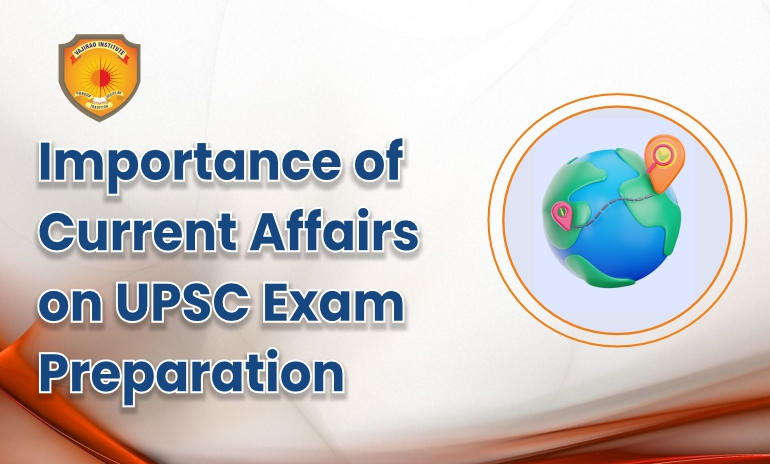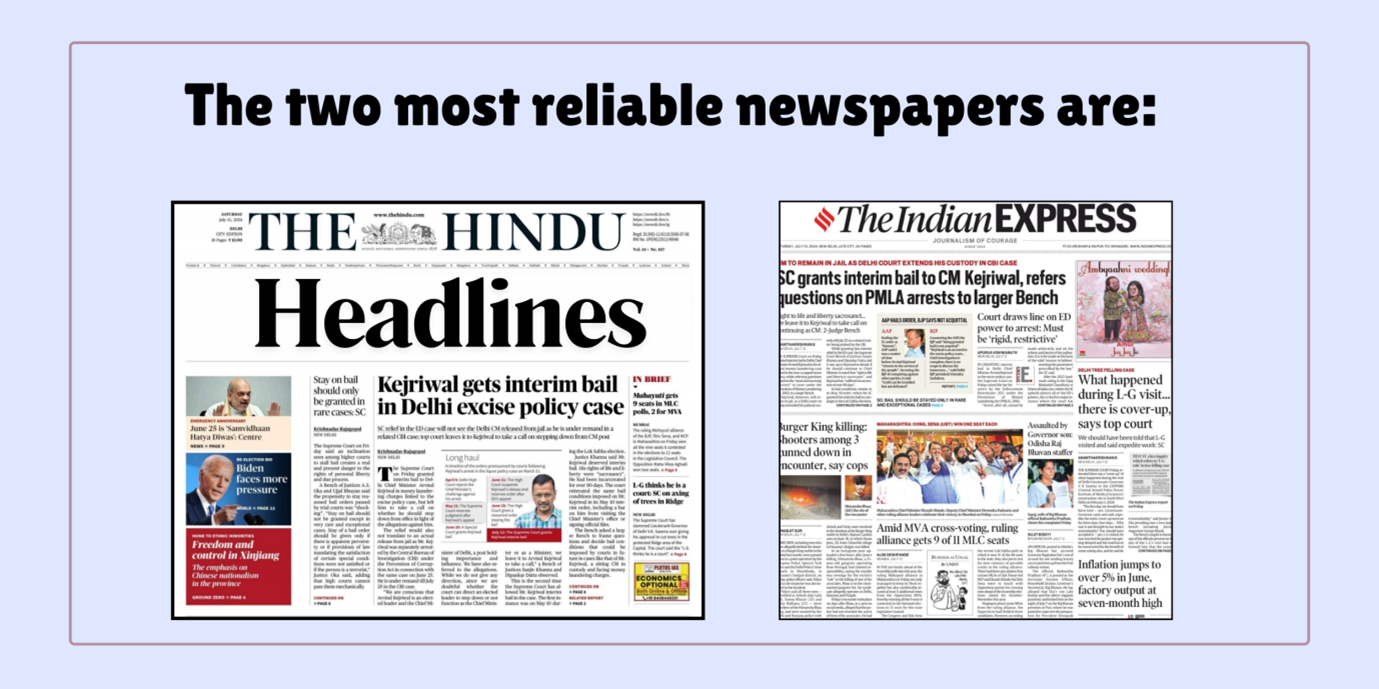
The UPSC CSE that is recognized as one of the most challenging competitive tests in the world is organised by the Union Public
Service Commission in India. For hopeful civil servants with different backgrounds, this examination is their ticket to the
positions including the IAS, IPS, and IFS among others. In this UPSC has clearly mentioned in its syllabus about the Current
Affairs. As in prelims and Mains Exam it has stated that, the events of Current that are of national and International
importance should be covered by Aspirants for the UPSC CS Examination. Therefore Current Affairs forms a major portion
of the Syllabus. As per the trend of the Past Years UPSC is asking more questions from this section which ultimately
tells us about its importance in the Examination. So it is important to cover current affairs. Here we will see its
significance and how to deal with it.
Why Current Affairs Matter:

The UPSC CSE preparation revolves around current affairs. Here’s why they are indispensable:
- A. Newspapers Are Your Best Friends: Choose your dailies from The Hindu, The Indian Express, etc. Cover editorials and
national/international news mainly. Many students’ gets confused while reading newspapers which part to read and which to
leave to deal with this go through your syllabus thoroughly and after that you can identify the news related to topics in
your syllabus and those are the ones that you have to read. The two most reliable newspapers are:
1. The Hindu:
- a) It’s not only a newspaper but an institution for union public service commission aspirants, because:
- Comprehensive Coverage: The Hindu newspaper involves news relating to politics, government, economy, science, and international system. It is like a feast of information you can take and consume all you want for UPSC CSE.
- Unbiased Reporting: The Hindu is also termed to be more neutral in its Reporting as well as in its editorial opinion too. That is why as an aspirant you will be glad that it has a balanced approach.
- Editorial Analysis: The section with editorials and opinions can be called the box with treasures in the world of intellect. They provide different points of view and do analysis of various issues. Read them religiously and write in your words.
Tips to master Current Affairs:

Mastering current affairs for the UPSC CSE is crucial, and here are ten points to guide you on this
exciting journey:
A. Newspapers Are Your Best Friends: Choose your dailies from The Hindu, The Indian Express, etc. Cover editorials and
national/international news mainly. Many students’ gets confused while reading newspapers which part to read and which to
leave to deal with this go through your syllabus thoroughly and after that you can identify the news related to topics
in your syllabus and those are the ones that you have to read. The two most reliable newspapers are:

1. The Hindu:
- Comprehensive Coverage: The Hindu newspaper involves news relating to politics, government, economy, science, and international system. It is like a feast of information you can take and consume all you want for UPSC CSE.
- Unbiased Reporting: The Hindu is also termed to be more neutral in its Reporting as well as in its editorial opinion too. That is why as an aspirant you will be glad that it has a balanced approach.
- Editorial Analysis: The section with editorials and opinions can be called the box with treasures in the world of intellect. They provide different points of view and do analysis of various issues. Read them religiously and write in your words.
2. The Indian Express:
- a. Indian Express is like that cool friend who always has a fresh take on things and following makes it useful for UPSC
CSE:
- i. Unique Perspective: Indian Express is unique with its coverage on investigative journalism, intensive reports,
and its analysis. It does not hesitate from asking the difficult questions.
- ii. News vs. Opinions: Indeed, it separates news from opinions very well. Therefore, the reader is able to distinguish
when he or she is receiving facts and when he or she is getting one person’s perspective.
- Where to Find It: available in both online and offline mode.
How to make notes from the newspapers
- Select Your Scroll (Newspaper): one can read according to its preference among The Hindu or The Indian Express.
- Organize by Subjects: Establish subcategories for the syllabus topics – It is like having the tab sections in a book.
- Abbreviate Wisely: Acronyms for significant concepts should be utilized, for instance, High Court should be abbreviated as HC.
- Cross-Reference and Verify: cross check and verify your information from several sources that are trustworthy.
- Translate Arcane Texts: Break down the concepts into easy-to-comprehend sentences.
- Stay updated: Always make new updates to notes with some new development.
B. Monthly Magazines and Yearly Compilations: Yojana, Kurukshetra and Down to Earth are few of the magazines one must subscribe for. These offer elaborated information of Governmental plans, strategies, and socio-economic concerns. Also you can turn to yearly compilations when you feel you are in need of the overall picture. They has the following significance in the UPSC CSE preparation:
Magazines are one of the most useful assets for UPSC CSE (Civil Services Examination). Here’s a concise overview:
- Comprehensive Coverage: Reading Magazine gives a roundup of Current affairs and issues of today’s society. Unlike simple headlines that are shared on the social media platforms and other widely used social information systems, they are presented with deeper analysis, opinions from professionals, and insightful debates.
- Holistic Understanding: Socio-economic, political and environmental publications of quality include Yojana, Kurukshetra, and Down to Earth. They assist Aspirants in developing a sophisticated perspective of the matter at hand.
- Government Perspectives: It can be noted that the magazines often have the government’s perspective, which is useful for mains exam. They offer a variety of views hence giving the aspiring officers a chance to develop fair outlooks.
- Success Stories and Mock Tests: Some of these magazines have sections where they give success stories of previous Aspirants of UPSC CSE. Also, they conduct sample tests and this is very important as the candidate prepares to sit for the actual exams.
- C. Government Reports and Surveys: venture into the Economic Survey, Budget papers, and any papers by NITI Aayog and Census data. That is why they are volumetric, packed with information and useful statistics.
- D. Online Portals and Apps: Go for PRS Legislative Research, PIB portal, and RSTV (Rajya Sabha TV). They provide parliamentarians’ short digest on debates, bills, and government plans.
- E. International Affairs: Be knowledgeable on current affairs obtain information on current events happening around the world. It is important to read international relation and treaties information, as well as any new developments in geopolitics. Especially Foreign Policy, Brookings and Carnegie Endowment for International Peace.
- F. Focus on Editorials and Opinion parts: These parts are opinionated in various ways. Overall consider the Pros and cons and the circumstances under which some policies are made.
- G. Weekly Current Affairs Quizzes: Always, take a quiz to check how much you have grasped the concepts and ideas. To support these topics, websites such as VajiRao & Reddy have quizzes that can be taken to review the content.
- H. Historical Context Matters: Make connections with history as they probe current occurrences. Learn how earlier choices define the current situation.
- I. Revise Regularly: It should not be merely read, but rewriting what has been learnt. Generalize knowledge creation in notes or mind maps for the purpose of keeping information in your brain.
- J. Stay Balanced: However, no matter how crucial the current affairs may be, do not skip sections that are static in nature, these include history, geography as well as polity. Equally so as this helps one to balance in preparation of the exams.
- K. Use Diagrams and Flow Charts: Incorporation of a combination of diagrams and flowcharts while preparing for the current affairs section for UPSC CSE can be useful trick. These charts and graphs help in grasping a topic, require lesser time in terms of responding and make your answers more eloquent.
Why and When Can Diagrams and Flowcharts Be Useful?
- a) Enhanced Answer Quality: Diagrams demonstrate an understanding of ideas and principles you’re learning.
- b) Time-Saving: During the mains exam, diagrams prove to be effective in passing on information to the examiner because time is usually a limiting factor.
- c) Effective Summary: They give out a lot of information in just one form or the other.
- d) Geography Advantage: The geography diagrams (or maps) would prove to be very useful on the GS Paper 1 component.
Tips for Creating flow charts and Diagrams:
- a) Labels: It is important for you to properly label your diagrams. Clearly mentions every part of it.
- b) Neatness: Both should be neat and in the right size depending in the information that is being sought.
- c) Relevance: There should be some relevance between the visuals and the answer or point being made where they are positioned.
- d) Stationery: Choose appropriate writing materials (pens, pencils, sharpeners, protractors) to make it accurate.
- e) Practice: practice making diagrams on a daily basis particularly when studying for the UPSC examinations.
Newspaper
- The Hindu: Recognized for its coverage of virtually every story out there and lack of a specific bias.
- The Indian Express: Allows presenting personal views and carrying out investigations.
Quality Magazines:
- Yojana: Gives insight into the government programs, social, economic condition, and policies.
- Kurukshetra: Specializes in rural areas and agricultural along with the policies associated.
- Down to earth: provides an overview of the environmental issues and the appropriate measures.
Online Resources:
- PIB
- Various Ministries of GOI
- UN organisations
- World bank
- UNEP
- Outlook reports of IMF